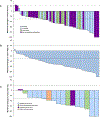Efficacy of Selpercatinib in RET-Altered Thyroid Cancers
- PMID: 32846061
- PMCID: PMC10777663
- DOI: 10.1056/NEJMoa2005651
Efficacy of Selpercatinib in RET-Altered Thyroid Cancers
Abstract
Background: RET mutations occur in 70% of medullary thyroid cancers, and RET fusions occur rarely in other thyroid cancers. In patients with RET-altered thyroid cancers, the efficacy and safety of selective RET inhibition are unknown.
Methods: We enrolled patients with RET-mutant medullary thyroid cancer with or without previous vandetanib or cabozantinib treatment, as well as those with previously treated RET fusion-positive thyroid cancer, in a phase 1-2 trial of selpercatinib. The primary end point was an objective response (a complete or partial response), as determined by an independent review committee. Secondary end points included the duration of response, progression-free survival, and safety.
Results: In the first 55 consecutively enrolled patients with RET-mutant medullary thyroid cancer who had previously received vandetanib, cabozantinib, or both, the percentage who had a response was 69% (95% confidence interval [CI], 55 to 81), and 1-year progression-free survival was 82% (95% CI, 69 to 90). In 88 patients with RET-mutant medullary thyroid cancer who had not previously received vandetanib or cabozantinib, the percentage who had a response was 73% (95% CI, 62 to 82), and 1-year progression-free survival was 92% (95% CI, 82 to 97). In 19 patients with previously treated RET fusion-positive thyroid cancer, the percentage who had a response was 79% (95% CI, 54 to 94), and 1-year progression-free survival was 64% (95% CI, 37 to 82). The most common adverse events of grade 3 or higher were hypertension (in 21% of the patients), increased alanine aminotransferase level (in 11%), increased aspartate aminotransferase level (in 9%), hyponatremia (in 8%), and diarrhea (in 6%). Of all 531 patients treated, 12 (2%) discontinued selpercatinib owing to drug-related adverse events.
Conclusions: In this phase 1-2 trial, selpercatinib showed durable efficacy with mainly low-grade toxic effects in patients with medullary thyroid cancer with and without previous vandetanib or cabozantinib treatment. (Funded by Loxo Oncology and others; LIBRETTO-001 ClinicalTrials.gov number, NCT03157128.).
Copyright © 2020 Massachusetts Medical Society.
Figures


Comment in
-
Selpercatinib Aimed at RET-Altered Cancers.N Engl J Med. 2020 Aug 27;383(9):868-869. doi: 10.1056/NEJMe2024831. N Engl J Med. 2020. PMID: 32846067 No abstract available.
References
-
- Liu Z, Hou P, Ji M, et al. Highly prevalent genetic alterations in receptor tyrosine kinases and phosphatidylinositol 3-kinase/akt and mitogen-activated protein kinase pathways in anaplastic and follicular thyroid cancers. The Journal of clinical endocrinology and metabolism 2008;93:3106–16. - PubMed
Publication types
MeSH terms
Substances
Associated data
Grants and funding
LinkOut - more resources
Full Text Sources
Other Literature Sources
Medical
